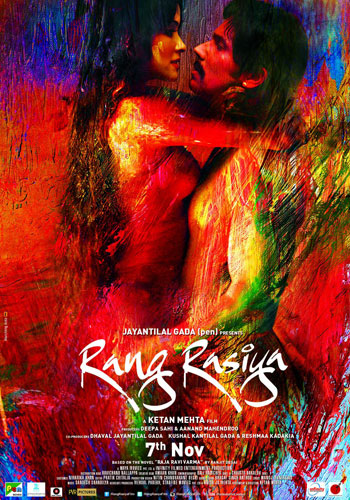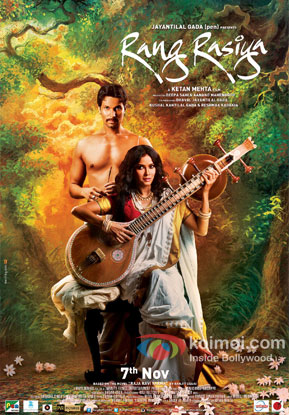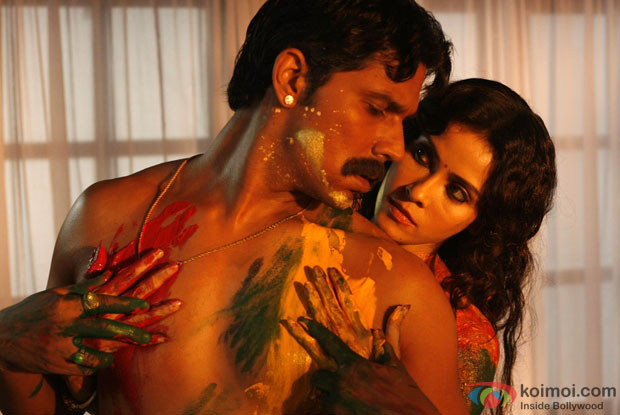
Genre: Period Drama
Release Date: 7th November, 2014
Cast: Randeep Hooda, Nandana Sen, Paresh Rawal, Ashish Vidyarthi, Rajat Kapoor, Sachin Khedekar, Vikram Gokhle, Suhasini Mulay
Director: Ketan Mehta
Writer/s: Ketan Mehta, Sanjeev Dutta
Producer/s: Anand Mahendroo, Deepa Sahi
Music Director: Sandesh Shandilya
Plot:

Rating: 4/5 Stars (Four stars)
Star Cast: Randeep Hooda, Nandana Sen, Paresh Rawal, Ashish Vidyarthi, Rajat Kapoor, Sachin Khedekar, Vikram Gokhle, Suhasini Mulay
Director: Ketan Mehta
What’s Good: The vision of the film is definitely not for the myopic. It expects you to widen the parameters of your thought process and transports you into a world linked inextricably with our history and culture.
What’s Bad: The film’s first half is a little slow, and might even drag in places but for most part, even its relatively weaker first half is building towards its heartbreaking, yet beautiful climax.
Loo break: None
Watch or Not?: Salman Rushdie had once said, Freedom of expression ceases to exist without the freedom to offend. Ketan Mehta doesn’t shirk from taking the pique stand in telling a well blended tale about love, passion, virtue, chastity and the brooding demand to adhere to social norms, bringing into relevance Raja Ravi Varma’s story which is more than a century old. Mehta’s line of thought was simple, while gadgets and technology is progressing, our minds are still not free from the shackles of primitive thinking. Rang Rasiya is more courageous than bold, more sensitive in its narrative than preachy or aggressive and more relevant than any one of his recent films. The canvas and vision of the film is massive and the movie doesn’t step on wrong foot ever, staying brutally honest to what it attempts to say. This is one Ketan’s most effortless, most nuanced and most impactful works and definitely one of recent times’ most powerful and moving films, I had the good fortune of watching.
User Rating:
Based on Desai’s novel on Raja Ravi Varma (Randeep Hooda), the film deals with the court case slapped on the iconic artist for painting nude images of women and giving face to Indian Goddesses. Religious gurus filed him for propagating vulgarity and hurting religious sentiments. The film traces his story through his childhood, his marriage, his muses, his love and inspiration from Sugandha (Nandana Sen) who pushed him to deliver his best work and of course about how the fate of that case changed the face of law’s perception towards art and censorship.
A case whose ruling is relevant even today; despite science taking over, logical and wide thinking hasn’t prevailed clearly. The film is an eye opener for many who think limited and judge art from a moralistic point of view.

Rang Rasiya Review: Script Analysis
The focus of the film is on a court case that was filed against Raja Ravi Varma for hurting religious sentiments and propagating vulgarity. The film begins with an art exhibition in Mumbai and extremists and fundamentalists looking to vandalize the place but is then traced back to Raja Ravi Varma’s history and childhood in Kerala. The first half of the film is entirely a historical narrative of the course of events how and why they happened. Ravi Varma’s first muse and his relationship with her, seemed exceedingly frivolous and not much time was wasted on explaining how his marriage fell apart.
The momentum of the film gathers when the film embarks on his individual self discovery and his relationship with his prime muse Sugandha. Mesmerized by her beauty, he finds himself being exceedingly drawn towards her physically, emotionally, ‘like an artist to his muse’. There is a very beautiful scene in the film where Raja Ravi Varma refuses to make copies of artifacts and paintings abroad and denies taking a tour of Europe to draw inspiration from there. In him, was a man so deeply rooted in his rich cultural heritage, in his folklore stories that he found gaping the West futile. He begins a journey across India, exploring its picturesque scenic beauty, it’s beautiful stories and finds himself taking a relevant, modern take on it.
The biggest accomplishment of Raja Ravi Varma was his ability to make God available to all. The Hindu Caste Structure is so tightly wrapped in religion that for a good part of centuries, the religion had ostracized its lower castes. Ketan’s story very carefully conveys it and the hard hitting tone is draped in subtlety. The enormity is conveyed in very few words, in few actions. In another scene, where Raja Ravi Varma’s paintings were opened up to the common man in an exhibition, a peasant was seen howling and worshiping Lord Rama, depicted in one of his paintings inspired from the Rmayana. God was kept obsolete from the lower castes, reserved only for the elites and had it not been for Raja Ravi Varma, to democratize a caste ridden, bogged down Hindu Religion would have been impossible.
The final and most important facet of this story is Ravi’s relationship with Sugandha. It’s evidently based out of love but is more of an artist’s obsession with his muse. Ravi’s character has its own selfish tinge to it where he finds his creative inspiration from Sugandha but there is the tingling music of romance between them and their chemistry is beautiful. In what will be called the film’s most controversial scene, the complex relations between the two is unleashed. Ravi caught in a creative limbo, dissatisfied and how his muse brings herself alive to draw him to paint her all over again in an avatar that will bring him to life. It takes a deep knowledge of human understanding and human relationships to bring so many layers in a scene that is easily beyond the purview of those who have a narrow minded thinking.
Rang Rasiya Review: Star Performances
Randeep Hooda was used in his nascent best. The actor gives his rustic swag a look uncannily different from what we recognize him from. From playing a frivolous flirt in scenes to a heartbroken painter whose muse was socially humiliated because of him, he brings an ethereal quality in his performance delivering undoubtedly his best.
Nandana Sen, whom I had last seen in Autograph, looks radiant in every frame, bringing poignancy to her performance. Vulnerable in love, drawing strength from the same, it’s her heartbreak and breakdown of faith that makes the climax so surreal.
Paresh Rawal as the the scheming Seth was great. Sachin Khedekar was again good in his part. Even the naive, young and equally stellar Ferena Wazair has done a memorable job.






